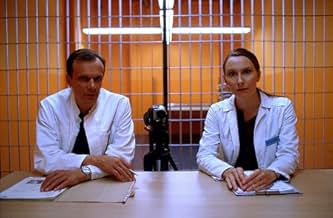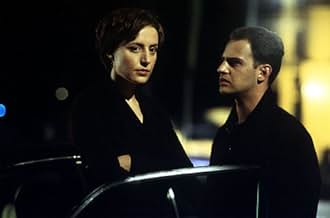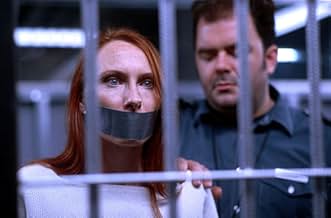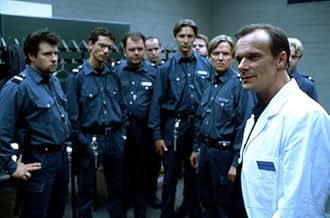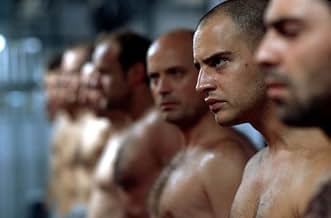For two weeks, 20 male participants are hired to play prisoners and guards in a prison. The "prisoners" have to follow seemingly mild rules, and the "guards" are told to retain order without... Read allFor two weeks, 20 male participants are hired to play prisoners and guards in a prison. The "prisoners" have to follow seemingly mild rules, and the "guards" are told to retain order without using physical violence.For two weeks, 20 male participants are hired to play prisoners and guards in a prison. The "prisoners" have to follow seemingly mild rules, and the "guards" are told to retain order without using physical violence.
- Awards
- 14 wins & 14 nominations total
- Häftling Nr. 86
- (as Thorsten J.H. Dersch)
- Berus
- (as Justus von Dohnànyi)
- Bosch
- (as Antoine Monot Jr.)
Featured reviews
Based on a true story, the notorious Standford Prison Experiment in 1971, the film tells the story of 20 men who volunteer to be placed into a makeshift prison for 12 days. Once inside, some are chosen to be guards whilst the others will act the role of prisoners, a process that involves abandoning their names, their clothing and their civil rights for the duration of the experiment.
The job of the guards is simple, maintain peace and order at all times without using physical violence.
At the heart of the film is Tarek, prisoner 77, an undercover journalist who is secretly filming from inside the prison, hoping to sell his exclusive once it's over. Tarek underestimates his own role in the experiment, though. He starts in irreverent mood, thinking it's just a game until he sparks a conflict with one of the guards, Berus. The two adversaries drive each other on relentlessly forcing the experiment to become darker, more grotesque, as each man fights for their own idea of power and identity.
Das Experiment asks what happens when good people are put in an evil place. Does humanity win over evil, or does evil triumph ? Also, it examines the role of memory when faced with extreme stress and deprivation. Whilst the film is based on a true story, it's cinematic influences can be traced back to Samuel Fuller's masterpiece "Shock Corridor" and, to a lesser extent, Chris Marker's "La Jetee". The comparisons to "Shock Corridor" are there for all to see but it's also worth noting that in all three films, the protagonists are obsessed with the memory of a girl, often using that memory as an anchor to cling on to a more idealised past, a potential escape route from the situation they find themselves in. For Tarek, as the situation becomes more extreme, the memories become stronger and stronger as he attempts to block out the present and focus on the past and a possible future with the girl.
Das Experiment is more than simple homage and pop psychology, though, largely due to it's director. In his first film, Hirschbiegel manages to create an entirely dark world, both inside and outside of the prison. Only in the final frames of the film do we see any natural daylight at all which offers stark contrast to everything we've seen before. The sense of claustrophobia, the complete lack of space, carefully manipulates the viewer throughout the film and, at times, it's genuinely unnerving. Consequently, it's difficult to find any real distance between yourself and the film as you become more and more absorbed. Like the characters within the prison there appears to be escape route for the viewer. A sparse script and real sensitivity from the actors, none of them overplaying their role, only adds further to the film's power. Moritz Bleibtreu (Run Lola Run) is particularly strong as Tarek whilst Justus Von Dohnanyi is positively menacing in the role of the sadistic guard Berus.
Hirschbiegel would, of course, develop these themes further in Downfall a few years later and in many senses, Das Experiment can be seen as a companion piece to the latter. As a debut work it's nothing short of astonishing, a director completely in control of the film and the viewer. Cinema not for the faint hearted, where you have to go the dark places first before you can see the light.
Based on the infamous experiments carried out at Stanford in the 1970's, this film had it all going for it in terms of being an effective thriller while also looking at the ways that human nature will gravitate towards the cruel once they are placed in positions of power. I decided to watch this film because it seemed interesting on this basis but also very topical considering the behaviour of the US soldiers in the Iraq prisons mostly poor 'white trash' types who were corrupted when they suddenly found themselves in a position they had never been in before control. Like them, the characters here gradually get more extreme just like they did in the real experiment as well. With this topicality it is no surprise that I was easily taken in by the film and was never really bored by it. Being a thriller in its own right, the film has to settle into the eventual action conclusion but even this works pretty well and doesn't detract from what has gone before in terms of interest.
This is not to say it is perfect, because it could have been much better than it was. The constant cutting to Tarek's girlfriend now and in flashback only took away from the film and she could have still played her part at the end with much less time during the main body of the film. Also it became a little too far-fetched for the sake of drama a recent television drama in the UK did it differently by actually recreating the same experiment as opposed to this film which needed to go harder and faster in order to reach the eventual running and fighting stage! But it still works and, to be honest, it is well worth seeking out for the 'human nature' aspect alone it had a special resonance in Germany but it is hard not to be put in a thoughtful mood given recent events in Iraqi military prisons.
The cast are roundly good and all slip one way or the other in a convincing manner. Beibtreu is good once he gets past the stage where he is making trouble for the sake of it this is necessary to speed the descent into cruelty but it was laid on a bit thick at the start. After this his performance is much more evenly balanced and he is a good lead. I struggled to pick up the names of all the others because they were mostly unknown to me but the head guard was very good while the rest of the cast did more than just deliver their pigeon-holed characters, where really they could have been nothing more than 'prisoner who goes crazy', 'timid guard', 'angry guard', 'silent prisoner' etc they weren't, they were all pretty real people.
Overall this is not the best thing to come to if you are after a sort of documentary drama about the original experiment but it is still a very good film. It is exciting and dramatic while still having a bit of a brain on it an asset made more interesting by what we have seen in Iraq over the past few months with guards becoming even worse than those we see in this film! Not a perfect film but a well made one that is interesting, involving and exciting and one that is well worth looking up.
If you have any claustrophobic tendencies or if you find it hard to endure situations of powerlessness, this film will be a total nightmare for you. But I urge you to see it anyway...
The acting is superb and the directing is moderate and intelligent. As a result, the potentially predictable story becomes very unpredictable. Its surprise effects are not sudden. You get plenty of time to realize what is about to happen (and how little you or anybody else can do about it...).
At one time, despite being almost completely absorbed by the suspense, I was able to look away from the screen and notice that I was sitting in a movie theater, at a safe distance from the experiment. Thank God!
My grade: 10 out of 10!
Did you know
- TriviaAlthough no one died in the Stanford Prison Experiment on which the movie was based, the experiment was prematurely ended after six days out of a planned two weeks. The college students assigned (randomly) to be prisoners were "withdrawing and behaving in pathological ways" as a result of the degrading treatment they received. Quite a few scenes in the movie actually happened in the original experiment, including the early fire extinguisher scene and the prisoners being forced to clean the toilets by their bare hands.
- GoofsOn the film poster Tarek is wearing number 82, but in the film he is number 77.
- Quotes
[last lines]
Nachrichtensprecher: [voiceover - spoiler] The tragic outcome: two dead, three injured, among them project leader Professor Klaus Thon. Clearly, the experiment went out of control after two days. The district attorney is investigating two possible manslaughter charges and several charges of abuse and negligence. One of the test participants has been arrested. The project direction will probably have to answer to a court. According to statements by one of the scientists, the escalation might have been prevented by aborting the experiment earlier.
- Alternate versionsThe first cinema version had an insert in the beginning of the movie which stated "This is based on the Stanford Prison Experiment". Since Prof. Philip Zimbardo wasn't asked by the filmmakers - and the movie doesn't really show the true experiment, but an exaggeration, the insert was changed to say "This movie is based on the novel Black Box"
- ConnectionsFeatured in Visionado obligado: El experimento (2012)
- SoundtracksOne Step Closer
Chester Bennington / Rob Bourdon / Brad Delson / Joseph Hahn / Mike Shinoda
Linkin Park
Mit freundlicher Genehmigung der
Zomba Enterprises Inc. / Zomba Songs Inc. / Rob Bourdon Music
Nondisclosure Agreement Music/Big Bad Mr.Hahn Music / Kenji Kobayashi Music
(all adm. by Zomba Songs Inc.) und der Wea Records, ein Geschaftsbereich
von Warner Music Germany GmbH
- How long is The Experiment?Powered by Alexa
Details
Box office
- Gross US & Canada
- $144,634
- Opening weekend US & Canada
- $19,857
- Sep 22, 2002
- Gross worldwide
- $13,782,896
- Runtime2 hours
- Color
- Sound mix
- Aspect ratio
- 1.85 : 1
Contribute to this page



![Trailer [OV]](https://m.media-amazon.com/images/M/MV5BOTMyNTI1MjctYTM2ZS00NmI4LThhZmUtZWExNjA2ZTllOWU1XkEyXkFqcGdeQXRyYW5zY29kZS13b3JrZmxvdw@@._V1_QL75_UX500_CR0)




